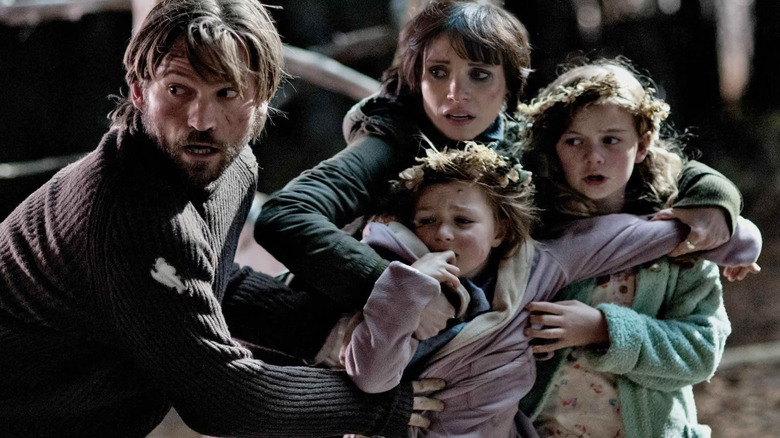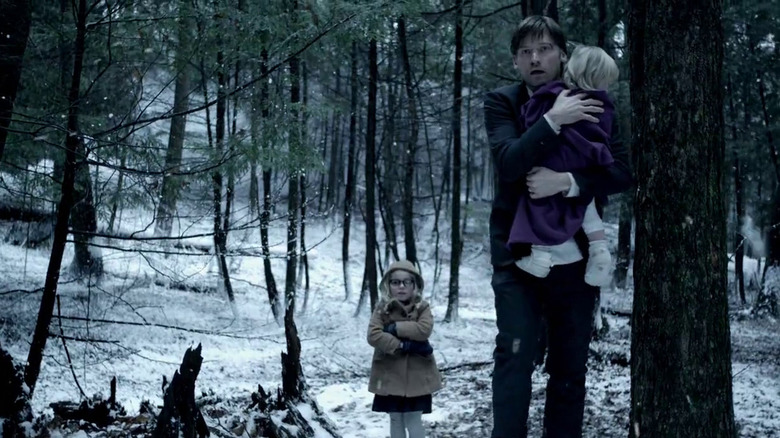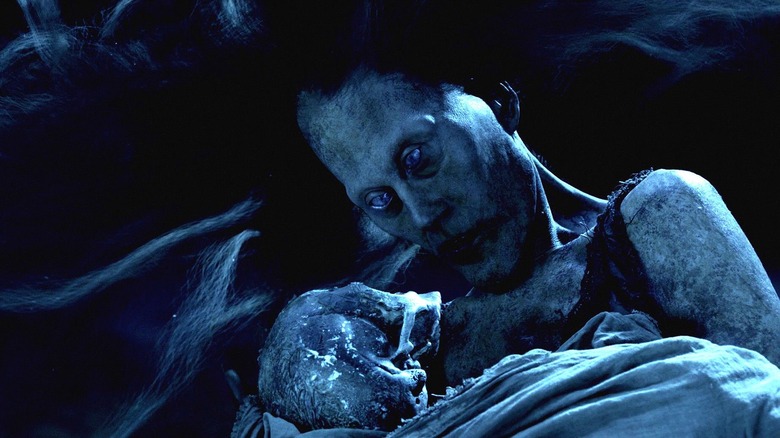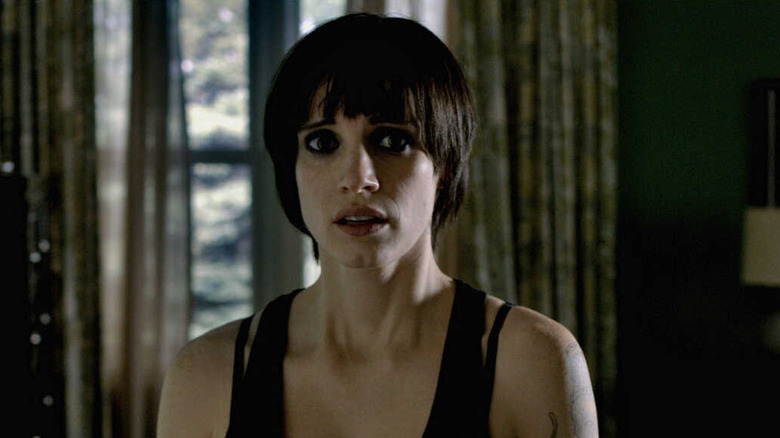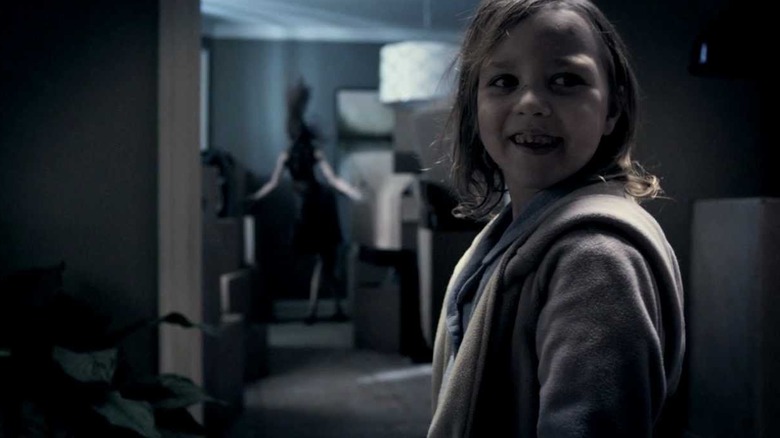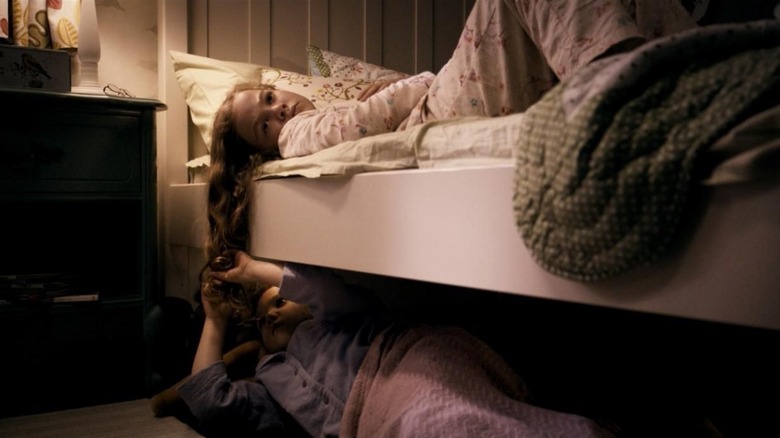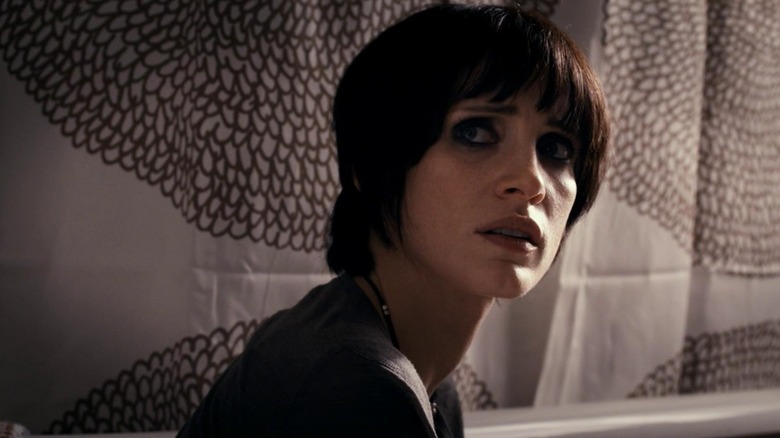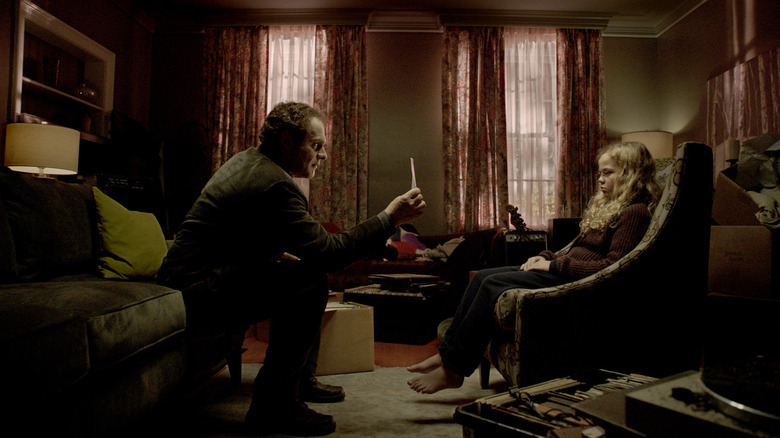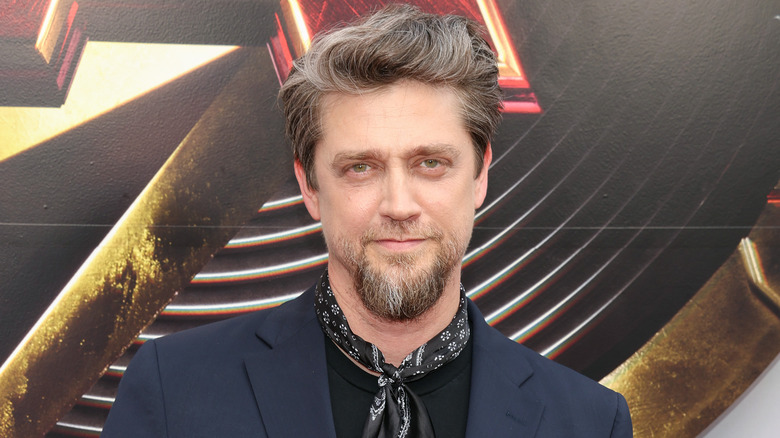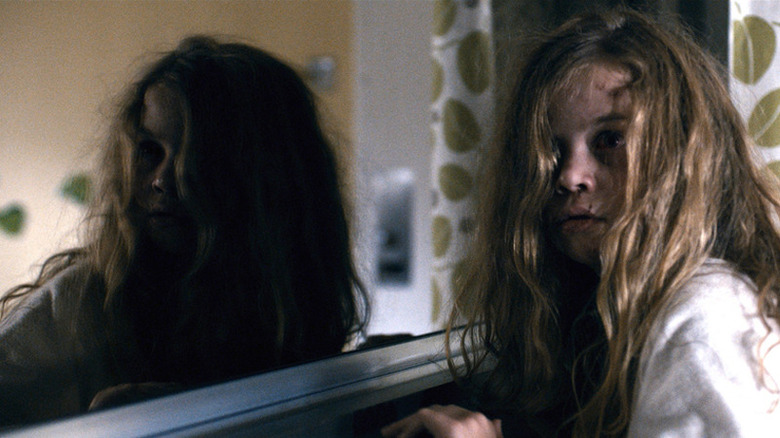The Ending Of Mama Explained
Director Andy Muschietti's decade-long stint as a feature film director has been incredible to watch as he's gone from breakout indie director to helming some of the biggest genre blockbusters. After breaking out onto the film scene with his 2013 debut, "Mama," Muschietti went on to direct an epic, two-part horror adaptation of Stephen King's "It" and then tackled "The Flash" for the DCEU. Now, he's set to direct the upcoming "The Brave and the Bold" for James Gunn's rebooted DCU. So, to celebrate Muschietti's continual success and evolution as a director, it's the perfect time to look back at the film that started it all for him — "Mama."
Based on his 2008 short film of the same name, "Mama" follows couple Annabel (Jessica Chastain) and Luke (Nikolaj Coster-Waldau) as they take care of Luke's abandoned nieces who have been living in the woods for five years after being left by their father, Jeffrey (also Coster-Waldau). However, they haven't been living alone as a mysterious and frightening entity has been helping them stay alive and has taken on a motherly role that it's not looking to give up any time soon. Annabel and Luke find this entity to be quite attached to the girls causing horrifying nightmares to become reality. "Mama" was the film that put Muschietti on the map, so let's do a retrospective dive into its ending and the impact it's had on his legacy.
What you need to remember about the plot
Before hopping to the ending of "Mama," let's do a quick recap of the big details of the story. So, Annabel and Luke end up taking care of Victoria (Megan Charpentier) and her younger sister, Lily (Isabelle Nelisse), after they're found in an abandoned cabin. Initially, Victoria and Lily are completely feral and struggle to make a connection with the human world. Slowly though, they become acclimated to civilized living and start to warm up to Annabel and Luke. However, Victoria and Lily unexpectedly bring along a mysterious maternal figure they refer to as Mama (Javier Botet). Mama is an absolute terror for Annabel and she ends up asking Dr. Dreyfus (Daniel Kash) to uncover the truth about this "Mama" figure.
Dreyfus' research and a dream-like vision that Annabel has weaves together the story surrounding Mama, who is actually the ghost of a troubled woman named Edith. Centuries prior, Edith was sent to an asylum and had her child taken from her. One day, she was able to escape and reclaim her baby before running into the woods while others pursued her. Eventually, she runs towards a cliff and decides to jump off with her baby in hand. However, they hit a branch on the way down causing her baby to get snagged and for Edith to drown in the water below. Now, Edith looks to reenact this event with Victoria and Lily since her spirit can't move on.
What happened at the end of the movie
Through everything that Annabel learns in Dr. Dreyfus' research, she discovers that Edith doesn't realize that her baby was snagged by a branch when they were falling. Thus, Edith's spirit was never able to fully be laid to rest and now lives on as this "Mama" entity and plans to take Victoria and Lily over the same cliff she jumped off of many years ago.
However, Annabel finds the corpse of Edith's baby in Dreyfus' files and brings it to the cliffs before Mama can take Victoria and Lily. The sight of her dead baby's corpse causes Edith to reappear and be visibly distraught by this realization. However, Lily's cries for Mama lead her to attack and nearly kill Annabel and Luke before bringing the girls toward the cliff.
Annabel puts up a fight to keep them from going with Mama though and although her efforts don't stop Mama, it does lead to Victoria choosing to stay with her new parents. Lily doesn't make the same choice though and Lily and Victoria have a tearful goodbye before Mama and Lily float over the cliff. Mama and Lily become shrouded by a shadowy cloak before plummeting towards the hanging branch, but the two share a loving embrace before they collide with the branch and explode into a flurry of moths. One of the moths lands on Victoria's hand and it now makes her believe that Lily is with her in spirit.
What does the end of the movie mean
It's no surprise that a film titled "Mama" has themes surrounding motherhood, but there's actually a lot to talk about with its ideas — mainly Annabel's arc and depiction as a newfound mother. Although Annabel isn't shown to be ready for motherhood in her introduction as she celebrates the negative result of her pregnancy test, she eventually comes to see her impact as a mother. Not only does she grow a stronger bond with the girls, but she even develops an empathy for Mama's pain from losing her child.
Her decision to try and alleviate Edith's anguish by showing her the corpse of her baby is a strong change in her arc and her constant fight to save Victoria and Lily shows her undying will to protect her children — a staple to any mother. This unique depiction of motherhood is actually something that Chastain has openly said she loves about Annabel as a character. In a press roundtable promoting the film (via We Got This Covered), Chastain discussed how "it's not that Annabel becomes a mother, but she becomes a hero of people." For Chastain, she believes that this experience makes Annabel become something more and it ultimately leads to her arc being a re-defining depiction of motherhood in film.
Another explanation
Another key theme in "Mama" is how it depicts nature vs. nurture — which is a psychological debate of whether our characteristics and instincts are developed from biological traits or our distinctive upbringing — through Victoria and Lily's arcs. For Lily, she has no memories of a life before Mama because she was so young when her father abandoned her and it's a key reason why she decides to go with Mama in the end. Regardless of the connection that's been built lately with Annabel, there's just something inside her that makes her see Mama as her true mother and it's why she's willing to go with her to the very end.
Victoria on the other hand does know a life before Mama and has an understanding that Annabel could be a great mother to her based on the experience she's had with her lately. While Mama did help take care of her for many years, Victoria understands that the life she had with her isn't one worth living and that Annabel can provide the kind of mothering and guidance that she really needs. She even understands that it's better for Lily to go with Mama and it's what makes the ending so tragic yet meaningful. So, Lily and Victoria represent the core elements of the nature vs. nurture debate, respectively, and they're what make "Mama" a multi-faceted look at motherhood.
What does the cast and crew think
Along with the film, itself, providing themes and ideas surrounding motherhood through its story and characters, both director Andy Muschietti and other members of the crew have talked about their feelings on the ending and the impact of the film. In an interview with Cinemablend, visual effects supervisor Ed Taylor said that "Mama" is about hope."It's about what a parent is — how do you define a parent? And it's about fighting for what you love," Taylor explained. This definitely rings true in the final stretch as Annabel takes more of a stand against Mama and puts up a stronger fight to save Victoria and Lily.
In the same interview, Muschietti delved into Annabel's transformation a bit and talked about how she isn't exactly your typical hero. "This is a woman who, by accident, from one day to the next has to take the responsibility of raising two little children who aren't hers. She's a reluctant hero," said Muschietti. This explanation is reflected in Annabel's arc; it's what makes her turn toward motherhood so compelling and adds to the impact and meaning of the film's name.
What the ending could mean for the franchise
Believe it or not — even though the ending of "Mama" feels incredibly definitive — there have been talks of a sequel for quite some time. However, it doesn't seem like one is coming any time soon. "Mama" was released to decent reviews from fans and critics back in 2013 and ended up having a great box-office haul of roughly $148 million against a budget of around $15 million.
So, it's not surprising that Universal had planned to do a sequel and possibly expand it into a bigger franchise. In an interview with Screen Daily, former Universal executive, David Kosse, mentioned that "We [Universal] think there's potential for a 'Mama' franchise," but he also highlighted that conversations around a sequel were in the early stages at the time.
However, they did eventually bring on "Pet Semetary" filmmaking duo, Dennis Widmeyer and Kevin Kolsch, to write and direct a sequel in 2016, but news on their progress has been minimal for quite some time. Frankly though, even if the sequel eventually starts to gain momentum in its development it's unlikely that Chastain would return to star — at least according to some insider reporting from The Wrap back in 2016. Still, though, it has been a while since that reporting and maybe Chastain could want to return. However, fans of "Mama" likely shouldn't be expecting a sequel any time soon.
Could there have been an alternate ending?
While some films have multiple endings or a lot of alternate endings that never made it to the final cut, that wasn't exactly the case for "Mama" and there's a specific reason for that. For Andy Muschietti and producer Guillermo del Toro, the heartbreaking elements of the ending are a necessary part of the film. In an interview with SlashFilm, they discussed why keeping the film's initial ending was so important. Although there was some belief that Universal executives might kill the film's original ending, Muschietti believed that "[it's] the only ending possible." "You start thinking this girl [Lily] can be recovered, but there's nothing to be recovered too because she doesn't know this world," said Muschietti, "so that's the happy ending, her going to Mama."
Del Toro heavily agreed with Muschietti and even talked about how dedicated he was to see this ending being the film's true ending. "I was amassing the weapons of mass destruction in case it was needed," said del Toro, "We financed the movie in a way that we had autonomy in the decisions." Luckily, del Toro mentioned that they didn't have to fight much since Universal also liked the ending so their vision for "Mama" was able to be maintained and accepted without any talks of an alternate ending.
How has the film has impacted Muschietti as a director
As mentioned before, the success and acclaim for "Mama" really set Andy Muschietti's career off excellently and he's been one of the most prominent rising forces in directing. Not only has Muschietti elevated his horror vision through his two incredible adaptations of "It" — which has redefined what a Stephen King adaptation can be — but now he's moved into the comic book movie space with "The Flash."
"The Flash" kicks off a new chapter in Muschietti's film career and shows that he can direct emotional and action-packed narratives outside of the horror genre — which is likely why he's already been tapped to direct more DC adaptations. Shortly after its release, it was announced that Muschietti is now set to direct the upcoming DCU film, "The Brave and the Bold" — which will follow Batman as he develops his relationship with his son, Damien, who becomes the new Robin.
Given that Gunn has sung continual praise for "The Flash" since taking over the DCU, it's no surprise that he would want to bring Muschietti along for the ride. Muschietti's journey as a director has been what most dream of — starting in a small yet personal film that builds towards a bigger and more thriving career.
How is the film looked back upon
Upon its initial release, "Mama" had a little bit of mixed reception from critics and audiences as many saw it as an indie horror film with an interesting concept that's seen as a little confusing. On Rotten Tomatoes, the "Critics Consensus" blurb reads as so: "If you're into old-school scares over cheap gore, you'll be able to get over Mama's confusing script and contrived plot devices." So, while it might not have been as beloved back in its initial showing, "Mama" has not only grown a fairly substantial cult following but has also been given some credit for being a unique horror movie that wasn't generally seen for the time.
John Squires of Bloody Disgusting wrote in a retrospective piece that "Mama" is a film that showcased Andy Muschietti's potential as a visionary and was a film that went against the norm for the typical Hollywood horror film. With ["Mama"] Muschietti proves that he's a visionary filmmaker of the highest order, wrote Squires. He continued, saying that "Muschietti's debut feature is less a run-of-the-mill horror film and more a striking piece of dark art. In more ways than one, it's quite unlike anything you'd ever expect to see in a Hollywood-made horror film." It's also fair to say that "Mama" predated and proved the potential of the indie horror space — which is undeniably thriving — so "Mama" continues to have a big impact and influence on the genre.
